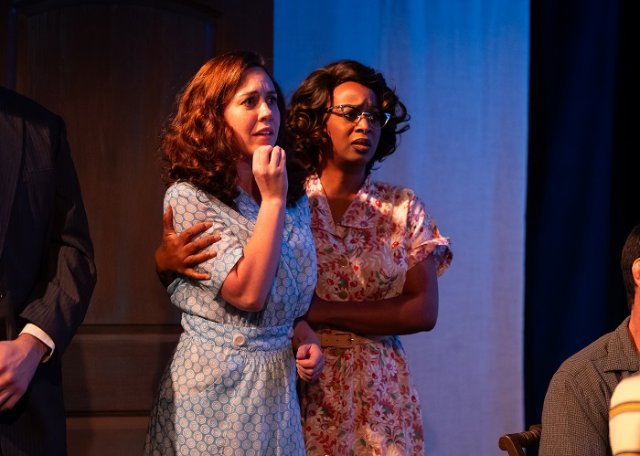A Streetcar Named Desire
New City Players near Ft. Lauderdale
By: Aaron Krause - Jul 23, 2024
“Bigger isn’t better.” So go the lyrics to a Cy Coleman and Michael Stewart song from the musical “Barnum.”
At least, bigger isn’t always better. A fine example is New City Players’ (NCP) small scale, yet heartfelt, haunting, heartbreaking, and sizzling current professional production of Tennessee Williams’ classic, sultry, poetic, Pulitzer Prize-winning 1947 tragedy, A Streetcar Named Desire.
In the two-hour and 45-minute production with an intermission, which runs through Aug. 4 in Island City Stage’s intimate blackbox theater in Wilton Manors, minimal scenery dots the stage. Also, the staging includes vivid sound effects. They suggest everything from dogs barking to thunderclaps and discomfiting echoey voices which vividly suggest the inner turmoil invading fading southern belle Blanche DuBois’s mind. The sounds also bring to life a noisy, rough, working-class neighborhood. Its environment is quite the opposite of the one that suffused the DuBois sisters’ refined and proper aristocratic background. Startling sounds also sometimes pierce the quiet. They unnerve Blanche as though she were in a jungle and a large cat suddenly appeared.
The sound designer is Ernesto K. Gonzalez. He, as well as everyone else onstage and behind the scenes, deserve kudos for staging an excellent production.
Was Blanche hallucinating? Maybe parts of, or even her entire visit to her sister Stella and brother-in-law Stanley’s New Orleans apartment in 1947 never took place.
In NCP’s production, it makes sense to suggest that it’s all (or at least partly) in Blanche’s mind. Indeed, she’s seeing and hearing things that are literally not there. Blanche doesn’t see certain things and neither do we in scenic designer Aubrey Kestell’s minimal two-level set. It consists of shelves of items such as cups, dishes, an ashtray, a telephone, chairs, tables, liquor bottles, books, and a naked light bulb. Things are absent from the set. That’s because it’s not a realistic, large-scale depiction of Stella and Stanley’s cramped apartment and the building that houses it.
For those unfamiliar with Streetcar, Williams wrote it during a period of change in America after World War II. Blanche DuBois, a fading Southern Belle from Mississippi with a troubled past, moves into her sister Stella’s and brother-in-law Stanley’s New Orleans apartment during the late 1940s.
Blanche, who carries an aristocratic heritage along with her sister, is an insecure, seemingly delicate and sensitive individual. In addition, she refuses to face reality and accept the truth. Instead, she prefers to live in a fantasy world where she can hide the facts of her life. Contrastingly, Stanley is a brutish, blunt-speaking working-class realist. Almost instantly, he dislikes Blanche and can see through Blanche’s lies and delusions. As the play progresses, Stanley unearths and reveals Blanche’s ugly past, ultimately driving the fading Southern Belle mad. Throughout, Stella feels torn between her loyalty to her husband and devotion to her sister.
In a story previewing this production, NCP acknowledged space and budget constraints. However, company members obviously did not let those limitations keep them from staging an impressive mounting. Instead, director Stuart Meltzer, Producing Artistic Director Tim Davis (who portrays Stanley) and Co. found ways to make limitations work to the production’s advantage. Good for them.
In the aforementioned preview story, Meltzer said, “Audiences can expect all the sexuality, sensuality, and poetry that lives in the sinew of Tennessee Williams’ writing.”
All that and more is present and accounted for in NCP’s production of this classic play. It is filled with drama, rich symbolism, conflict, passion, love, lust, violence, humor, and beautiful language.
The poetry lands, the sexuality and sensuality radiate heat, the music creates moods, and the pathos breaks hearts, thanks to the cast and Meltzer’s expert direction. To lighten the proceedings a bit, the melodrama-free production also includes well-placed humor. Meltzer is a multi-award-winning, highly respected director. It shows here. In just one smart decision, for instance, the director chooses not to call too much attention to the moment when Stanley strikes Stella. During a time when we are thinking of ways to empower women and achieve equality between the sexes, it’s not something you wish to highlight.
In order for us to feel heartbroken and empathy for Blanche, we have to care about her. And in NCP’s production, the company’s associate artistic director, Elizabeth Price, ensures that we care. The performer deftly conveys Blanche’s sensitivity and makes her as fragile as Amanda Wingfield’s glass items in another Williams classic, The Glass Menagerie. Price’s Blanche is also bewitching and dazed at times.
Under a head of shoulder-length blondish hair and over lips coated with dark red lipstick, Price’s wide, dark eyes betray a sense of helplessness, vulnerability, and dependence. Truly, your heart goes out to her. While Price’s Blanche is also jittery and easily moved to fits, the actor has also created a character who wins you over. She does so with her charm, her love of culture, and pretty things.
But Blanche also harbors negative characteristics. They include arrogance and hypocrisy, traits that Price also conveys without turning the character into a spiteful woman. While we may not condone Blanche’s weaknesses, perhaps they make us look inward at our own faults and failings. Also, they may remind us of people with similar faults.
Part of what makes Price’s tour-de-force performance memorable and impressive is that she makes the part her own. She doesn’t try to copy the performances offered by the many great performers who have portrayed Blanche over the years.
In addition to Price’s bigger acting choices (which are never too over-the-top), subtleties such as small facial expressions help to flesh out Blanche’s character.
Price and Jesus Reyna, as Harold Mitchell (“Mitch”) share strong chemistry throughout.
Reyna creates a tender and compassionate character, clearly differentiating Mitch from Stanley’s other loud, primitive poker buddies. With enthusiasm, sensitivity, and warmth in his voice, it’s clear why Reyna’s Mitch quickly wins over Blanche. But after this bachelor learns truths about Blanche’s dark life (at least the truths about Blanche that Stanley claims as fact), we witness a totally different Mitch. He shows up without any warning of the change coming. Instead of kindness in Mitch’s wide eyes, they betray accusation and shock through Reyna’s impressive performance. Also, bitterness drips from his voice.
Reyna is the only cast member who speaks with a convincing southern accent, but that’s about the only real flaw.
Other cast standouts include Casey Sacco as Stella. The dark-haired performer imbues her character with a generally happy, content air, suggesting that, despite an upbringing quite different from Stanley, her husband satisfies basic urges. While Sacco’s Stella is a free spirit, she is also easily upset by Stanley’s treatment of her sister or Blanche’s hateful comments about Stanley.
Clearly, Sacco’s Stella is a woman torn between her devotion to her husband and her love for her sister. At the end, a pained expression remains etched on her face and real-sounding tears emanate from Sacco’s Stella during the play’s tragic final moments.
In NCP’s production, a strong, loving bond is obvious between Stella and Davis’s Stanley. Watch as a smiling Stella runs into Stanley’s awaiting arms. When she reaches him, Davis picks her up and embraces her in a bear hug and kiss that look real, thanks in part to intimacy choreographer Jeni Hacker. Of course, the fact that Sacco is Davis’s fiancé probably also help the pair act in a believably loving manner.
Davis, a tall man with blondish hair, often leans forward in an aggressive posture as the actor portrays Stanley with an impulsive, even frightening disposition. No doubt, Davis’s Stanley has a vicious temper, and he can transition quickly and seamlessly from charming to violent. Davis’s volatile Stanley sometimes shouts thunderously and menace drips from him. Properly, Davis lends Stanley a primitiveness that fits the character. Listen as, in one scene, Davis’s Stanley makes noises with his mouth as he eats, suggesting a pig, or an unrefined, primitive brute.
But Davis also imbues Stanley with a casual and happy demeanor during calmer moments. This is true particularly in the beginning. Such moments help inject Stanley with redeeming qualities so that we don’t hate him from the outset. Davis’s Stanley isn’t a monster. Instead, he’s a proud, strong-willed, working-class realist of a man who is protective of his wife and doesn’t wish to witness Blanche possibly swindling Stella – or himself. Stanley and Blanche are opposites in many ways, and under Meltzer’s careful direction, a clear difference exists between the two.
Davis, like the other actors, are accomplished performers. They’ve either won and/or received nominations for awards. Clearly, they work well together, as does the entire cast. That includes the supporting players, Inez Barlatier, Sheena O. Murray, Alex Joyel, Russell Kerr, and Juan Gamero. They not only act but sing music that lends the production various moods, from haunting to upbeat. The songs enhance the musicality and poetic quality of Williams’ gorgeous language.
In the lighting department, designer Annabel Herrera’s work focuses the actors, and enhances moods. Also, the lighting’s intensity reinforces important moments and grabs our attention. At times, the lighting suggests a sunrise or sunset.
Costume designer Laura Turnbull has created character-appropriate, period outfits that differentiate characters from different social classes.
Fight choreographer David A. Hyland and dramaturg Ali Tallman also make important contributions to the production.
Why stage A Streetcar Named Desire, a period piece from the late 1940s? It’s part of our history, and it’s important to learn from it in order to pave the way for a better future. Besides, Williams has packed the play with relevant themes such as gender, class, death, sexual desire, fantasy, illusion, appearances, dependence, mental illness, masculinity and physicality.
Blanche DuBois is a tragic protagonist, although some may refer to her as an anti-heroine due to her undesirable traits. Listen to her: “I misrepresent things to (people). I don’t tell truth, I tell what ought to be truth. And if that is sinful, then let me be damned for it!”
She may be a liar, but at least she’s truthful about her dishonesty, unlike some people living today.
IF YOU GO
WHAT: New City Players’ upcoming production of Tennessee Williams’ steamy drama, A Streetcar Named Desire.
WHEN: July 13-Aug. 4. Performances will start at 8 p.m. Thursday-Saturday, and 3 p.m. Sunday. Due to many sold out performances, NCP is adding a performance at 7:30 p.m. on Wednesday, July 31.
WHERE: Island City Stage’s intimate black box theater, 2304 N. Dixie Highway in Wilton Manors.
TICKETS: $40 for adults, $35 for seniors (65+), and $25 for students (under 25 with ID) accept for opening night on July 13, on which an additional $5 per ticket will include a post-show reception. July 11 and 12 are $20 previews. To view a preview video, go to https://www.youtube.com/watch?v=90si76v9k9o.
WARNING: Smoking with tobacco-free herbal cigarettes will take place during the production. In addition, the sound of a gunshot will pierce the quiet.
ALSO: Jazzy Fridays will take place following the Friday performances. Enjoy live jazz and libations after every Friday show.
Saturday Spirits with Streetcar-themed cocktails will follow every Saturday performance.
Sunday Talkbacks are for those wishing to dig deeper into the themes and history of the play, as well as step into NCP’s theater making process. Sunday talkbacks will occur following every Sunday performance.
MORE INFO: Go to www.newcityplayers.org or call (954) 376-6114.




